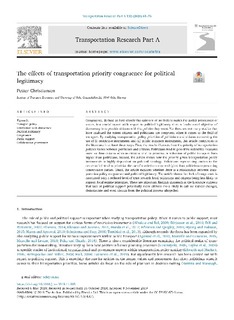| dc.contributor.author | Christiansen, Petter | |
| dc.coverage.spatial | Norway | nb_NO |
| dc.date.accessioned | 2019-12-17T12:55:46Z | |
| dc.date.available | 2019-12-17T12:55:46Z | |
| dc.date.created | 2019-12-05T13:53:51Z | |
| dc.date.issued | 2019-11-18 | |
| dc.identifier.citation | Transportation Research Part A: Policy and Practice. 2020, 132 (February), 61-76. | nb_NO |
| dc.identifier.issn | 0965-8564 | |
| dc.identifier.uri | http://hdl.handle.net/11250/2633677 | |
| dc.description.abstract | Congruence, defined as how closely the opinions of politicians match the policy preferences of voters, is a crucial aspect with respect to political legitimacy since a fundamental objective of democracy is to provide citizens with the policies they want. Yet there are not many studies that have analyzed the extent citizens and politicians are congruent when it comes to the field of transport. By studying transportation policy priorities of politicians and citizens concerning the use of (i) restrictive instruments and (ii) public transport instruments, this article contributes to the literature in at least three ways. First, the results illustrate how the priority of transportation policies varies between politicians and citizens. Politicians tend to prioritize restrictive measures more so than citizens whereas citizens tend to prioritize a reduction of public transport fares higher than politicians. Second, the article shows how the priority given transportation policy instruments is highly dependent on political ideology. Politicians representing parties to the center or left tend to prioritize the use of restrictive measures higher than politicians representing conservative parties. Third, the article explores whether there is a relationship between transportation policy congruence and political legitimacy. The article shows that lack of congruence is associated with a reduced level of trust towards local politicians and citizens being less likely to support local regime principles. These are important findings inasmuch as the literature suggests that lack of political support potentially make citizens more likely to call for radical changes, demonstrate and even abstain from the political process altogether. | nb_NO |
| dc.language.iso | eng | nb_NO |
| dc.publisher | Elsevier | nb_NO |
| dc.rights | Attribution-NonCommercial-NoDerivatives 4.0 Internasjonal | * |
| dc.rights.uri | http://creativecommons.org/licenses/by-nc-nd/4.0/deed.no | * |
| dc.title | The effects of transportation priority congruence for political legitimacy | nb_NO |
| dc.type | Journal article | nb_NO |
| dc.type | Peer reviewed | nb_NO |
| dc.rights.holder | © 2019 The Author. Published by Elsevier Ltd. | nb_NO |
| dc.description.version | publishedVersion | nb_NO |
| cristin.unitcode | 7482,1,1,0 | |
| cristin.unitname | Reisevaner og mobilitet | |
| cristin.ispublished | true | |
| cristin.fulltext | original | |
| cristin.qualitycode | 2 | |
| dc.identifier.doi | 10.1016/j.tra.2019.11.005 | |
| dc.identifier.cristin | 1757209 | |
| dc.source.journal | Transportation Research Part A: Policy and Practice | nb_NO |
| dc.source.volume | 132 | nb_NO |
| dc.source.issue | February | nb_NO |
| dc.source.pagenumber | 61-76 | nb_NO |
| dc.relation.project | Norges forskningsråd: 249733 | nb_NO |

